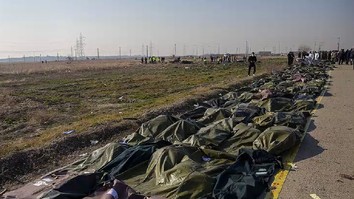BRUSSELS, Belgium -- Russian pilots' "reckless" and "unprofessional" behaviour in international airspace, which caused a US drone to crash Tuesday (March 14), once again demonstrates their flagrant disregard for international law, US officials said.
A Russian Su-27 jet struck the propeller of an American MQ-9 Reaper drone over the Black Sea, requiring the Reaper to be brought down in the water and resulting in its loss, US European Command (EUCOM) said in a statement.
"Several times before the collision, the Su-27s dumped fuel on and flew in front of the MQ-9 in a reckless, environmentally unsound and unprofessional manner," the statement said.
"This incident demonstrates a lack of competence in addition to being unsafe and unprofessional."
The MQ-9 unmanned aircraft was conducting routine operations in international airspace, according to US Air Force Gen. James B. Hecker, commander of US Air Forces Europe and Air Forces Africa.
"US and Allied aircraft will continue to operate in international airspace, and we call on the Russians to conduct themselves professionally and safely," he said, adding that "the Russians nearly caused both aircraft to crash".
"This incident follows a pattern of dangerous actions by Russian pilots while interacting with US and Allied aircraft over international airspace, including over the Black Sea," the EUCOM statement added.
"These aggressive actions by Russian aircrew are dangerous and could lead to miscalculation and unintended escalation."
'Raising the stakes'
Kyiv accused Russian President Vladimir Putin of trying to widen the conflict in Ukraine.
"The incident with the American MQ-9 Reaper UAV -- provoked by Russia over the Black Sea -- is Putin's way of signalling his readiness to expand the conflict to involve other parties," Ukrainian National Security and Defence Council secretary Oleksiy Danilov said Wednesday on social media.
"The purpose of this all-in tactic is to always be raising the stakes."
NATO diplomats in Brussels said they did not expect the incident to immediately escalate into a further confrontation.
A Western military source, speaking to AFP on condition of anonymity, said that diplomatic channels between Russia and the United States would be activated.
"To my mind, diplomatic channels will mitigate this," the source said.
The United States summoned the Russian ambassador to the State Department Tuesday afternoon, and the American ambassador in Moscow has also registered a "strong objection" to the incident, US State Department spokesman Ned Price told reporters.
"We are engaging directly with the Russians, again at senior levels, to convey our strong objections to this unsafe, unprofessional intercept, which caused the downing of the unmanned US aircraft," he said.
The incident marks a clear violation of international law, Price added.
The United States uses MQ-9 Reapers for both surveillance and strikes, and has long operated over the Black Sea keeping an eye on Russian naval forces.
"It is not uncommon... for there to be intercepts by Russian aircraft of US aircraft over the Black Sea," US National Security Council spokesman John Kirby told journalists in Washington, referring to one plane making visual or electronic contact with another.
But this case "is noteworthy because of how unsafe and unprofessional it was, indeed reckless that it was," he said.
"We don't need to have some sort of check-in with the Russians before we fly in international airspace. There's no requirement to do that, nor do we do it," he added.
Russia's Defence Ministry denied causing the drone to crash.
History of reckless provocations
Russian pilots have a long history of airspace provocations ever since Russia intervened in the Syrian civil war in 2015 on the side of President Bashar al-Assad.
In April 2020, in two separate incidents, Russian Su-35s intercepted a US Navy P-8A over the Mediterranean Sea, conducting high-speed inverted manoeuvres and coming within 7.5 metres of the US surveillance aircraft.
"The manoeuvres were unsafe and jeopardised the safety of the pilots and crew," the Navy said.
A month later, the Navy said two Russian Su-35s intercepted another Navy P-8A over the Mediterranean, in an encounter that lasted 65 minutes.
The encounter was "unsafe and unprofessional due to the Russian pilots taking close station on each wing of the P-8A simultaneously", it said.
On February 12 and 13, 2022, "three US Navy P-8A aircraft experienced unprofessional intercepts by Russian aircraft" in international airspace over the Mediterranean Sea, the Pentagon said at the time.
"While no one was hurt, interactions such as these could result in miscalculations and mistakes that lead to more dangerous outcomes," it said.

![An MQ-9 Reaper flies a training mission over the Nevada Test and Training Range in July 2019. [US Air Force]](/cnmi_pf/images/2023/03/17/41240-russian_aircraft_collides_into_us_unmanned_system_in_international_waters-585_329.jpg)






